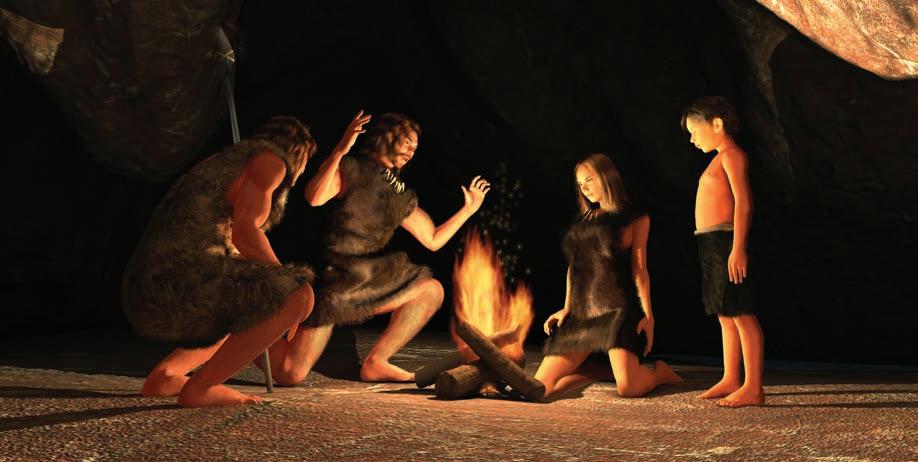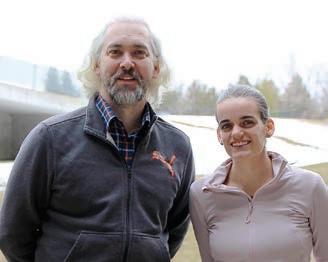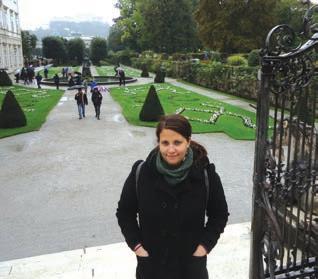
5 minute read
Spotlight on Research
As home to many of the world’s leading researchers, Trent University has many stories to tell when it comes to research success. Through our outstanding researchers, world-class facilities, and prestigious schools of study, Trent is a place where ideas and creativity connect and intersect with industry, nonprofits, communities and real-world solutions. Read more about some of the top faculty, student and alumni researchers who are making headlines.
FACULTY

FACULTY RESEARCH SPOTLIGHT Surprising Insights into Neanderthals’ and Early Humans’ Diet
Rabbits are speedy, hard to catch and don’t offer a lot of meat. Yet research from Trent University associate Anthropology professor Dr. Eugene Morin, published in Science Advances, has shown that rabbits were frequently eaten by early humans and Neanderthals as far back as 400,000 years ago. Professor Morin and Dr. Jacqueline Meier, University of North Florida, examined rabbit bone assemblages in present-day France at one of the earliest known locations that early humans hunted this type of game. Prof. Morin’s work challenges the general consensus that small fast-game hunting began about 40,000 years ago. The work also shows that even during early Paleolithic times, humans ate a wider variety of meats than previously thought. Horse, bison and deer made up the majority of the meat in their diet but this research shows they were able to expand their diet during food shortages— behaviour that was previously believed to be exclusive to early modern humans. “Hunting rabbit might have been an efficient strategy to prolong survival, and since rabbits could be hunted by individuals or small groups, rabbit hunts might have involved different degrees of social prestige and cooperation than those that targeted larger animals,” Prof. Morin explains. The research shows these early hunters may have also been using primitive traps or snares.

STUDENT RESEARCH SPOTLIGHT
Farmlands to Wetlands? Experiential Learning Lets Students Explore History, Policy of Restoration STUDENT
Two Trent University students will be researching this summer if and how farmed land can be returned to a natural wetland state.
The research, all conducted on Trent lands, is part of an experiential learning project for Shannon Farmer, third-year Environmental and Resource Science student, and Edward Smith, second-year Environmental Science and Economics student.
The students became involved with this project through the Society of Ecological Restoration, Trent University Chapter and it is a joint effort between students, faculty and the community.
“Our project is merely one of thousands happening today which will help people adapt to a changing world,” says Ms. Farmer, who will be collecting biological data on the wetland for her honours thesis. “We hope that by being open and sharing our story we can inspire others to be ecological stewards in their own lives.”
MORE #TRENTURESEARCH HIGHLIGHTS

ALUMNI
ALUMNI RESEARCH SPOTLIGHT Challenging Beliefs About What It Means to be Old
A community’s seniors are the keepers of its culture but we don’t always give that role the respect it deserves. Media stories about older people often focus on medical conditions like dementia, which younger people fear will make them dependent. “Representations of aging are important,” says Mariana Castelli Rosa, who graduated from the Public Texts M.A. program and is now a first-year Ph.D. student in Cultural Studies at Trent University. “They reveal deep-rooted beliefs about what we believe being old means. Older people are often marginalized, and it’s even more obvious when you look into the intersection of age and racialization. The kind of language we use influences research and we need to be aware of it to effect social change.” Ms. Castelli Rosa works as a research assistant in the Imagining Age-Friendly Communities within Communities, a multipartner research project that’s studying aging in seven Canadian cities. Her research looks at international models that could help improve Canada’s approach to aging and will also be a comparative analysis of how older people are represented in First Nations, Métis and Inuit literature. Bold research making a difference in the world. That’s the Trent University way. Read on for a sampling of the latest Trent research news featured at trentu.ca/news.
Federal Boost for Underwater Archaeology and Soil Health Two Trent University professors recently received $322,193 to support stateof-the-art labs and equipment for research into underwater archaeology and developing better sustainable agricultural management. Through the Canada Foundation for Innovation funding, Dr. James Conolly, Anthropology, received $158,414 to support his research, which is part of the new Maritime Archaeology Research Laboratory that offers world-class equipment to investigate underwater cultural heritage such as historic shipwrecks. Dr. Karen Thompson, School of the Environment, received $163,779, which supports research into improving soil health as a means to protect Canada’s natural resources while improving food security.
Making Science Easier to Understand Scientific understanding is pivotal to understanding pressing environmental issues such as climate change, forest loss and the destruction of biodiversity. Yet researchers often use language that is difficult for the general public to understand. The newly formed Trent Research Group for Communicating Conservation Science is tackling this issue head on, equipping researchers with the skills and tools they need to better communicate their research findings with the average person.
“We won’t find solutions to these issues without an informed public,” says Dr. Jim Schaefer, a Trent Biology professor and director of the group.
Bugs Aren’t Creepy to this ROM Intern In Meghan Ward’s world, bugs are more exciting than creepy. In fact, the Trent University student who’s double majoring in Biology and Biological Anthropology, says she’s ecstatic to have an internship that allows her to explore insects from across the world. Ms. Ward’s experiential learning opportunity is courtesy of the Royal Ontario Museum where she organizes a massive collection of insects, assigning labels to each specimen. She says her this experience has her considering an academic role in a museum setting.
Applying Cutting-Edge Research in Law and Policing Someone just confessed to murder on Reddit. Police and the courts are finding social media to be a brave new world when it comes to determining who is breaking the law primarily because users can hide behind fake accounts. Trent students explored these issues in modern-day law and policing in an innovative new fourth-year Forensics course. The course offered students the chance to explore a particular area of law and policing and then organize a year-end conference to present their findings to alumni currently working in the field.











